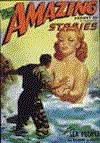|
|
|
'Dogma' more disappointing than offensive November 25, 1999 By Franklin Harris I shouldn't be surprised. Every time some church group decides to boycott some "immoral" or "blasphemous" movie or TV show, the movie or TV show in question turns out to be a clunker. It happened with "The Last Temptation of Christ." It happened with "Ellen." And now it has happened with "Dogma." Writer/director Kevin Smith's fourth film is the least of his efforts, including his unfairly maligned comedy, "Mallrats." None of Smith's films is much to look at, but you don't go to Kevin Smith films to be visually wowed. You go to hear funny, clever dialogue and get an occasional insight into male-female relationships. With "Dogma," however, Smith sets a loftier goal: He tries to take on all of organized religion in general and Catholicism in particular. The bigger target makes Smith's miss all the more obvious. "Dogma" is torn between being a sophomoric comedy, laced with jokes about sex and bodily functions, and being a serious examination of faith. And even the serious half of "Dogma" is fatally shallow. The dynamic duo of Ben Affleck and Matt Damon play Bartleby and Loki, two angels cast out of heaven after Bartleby talks Loki into leaving his high-profile job as the Angel of Death. After spending a few thousand years wandering the Earth (Wisconsin, to be exact), the two find a way back into heaven. Thanks to a "loophole" in Catholic dogma, all Bartleby and Loki need do is pass through the doorway of a reconsecrated church and their sins will be forgiven, allowing them back through the Pearly Gates. And because of a new campaign to make Catholicism more hip, it just so happens that a church in New Jersey is up for reconsecration. There is just one small problem: If they succeed, they will prove God fallible. And that will cause the entire universe to blink out of existence. Naturally, both the forces of Heaven and Hell take a dim view of this. So, Metatron (Alan Rickman), an angel who acts as the Voice of God, enlists the aid of Bethany (Linda Fiorintino) in stopping Bartleby and Loki. Unfortunately, Bethany is a reluctant crusader. She is a lapsed Catholic who works in an abortion clinic. It is only after her prophetic run-in with Smith's reoccurring misfits, Jay and Silent Bob (Jason Mewes and Smith), that she agrees to make the trip from Illinois to New Jersey. Along the way, Bethany runs into a variety of odd characters. Comedian Chris Rock plays Rufus, the black "13th Apostle," who complains that the New Testament's authors -- pardon the pun -- whitewashed him from the Bible. Filling out the cast are George Carlin as Cardinal Glick, Salma Hayek as a muse, Smith regular Jason Lee as the demon Azrael and singer Alanis Morissette as the Almighty herself. Part of the film's problem is that it has too many characters given too little to do. The inclusion of Jay and Silent Bob, who have appeared in all of Smith's movies, is Smith's most self-indulgent mistake. Aside from the fact that they are hopelessly out of place, they serve no function that couldn't be transferred to another character. Rock could easily take up their slack, but, with them around he has nothing to do but deliver an inferior version of his stand-up routine. What many regard as the overly legalistic theology of Roman Catholicism is an easy target for Smith. After all, Protestants have been making the same points, rightly or wrongly, for several hundred years. But Smith's alternative is shallow, New Age gobbledygook, summed up by Rufus' claim that people should have "ideas" instead of "beliefs." And here I always thought you had to believe in ideas. Bethany's inevitable crisis of faith comes across as cliched, right down to when she shouts, "Why me?" at the world. It's too bad. "Dogma" has its moments. Affleck and Damon's scenes are all effective, as is Affleck's own crisis of faith late in the film. Had Smith centered the film on the angels rather than on Fiorintino's character, "Dogma" would be a far different and more interesting movie. Plus, there is something unintentionally humorous about Morissette's God, whose voice is so powerful it kills anyone who hears it. I always suspected Morissette's voice could have that effect. |

RECENT COLUMNS
Order a helping of Cartoon Network's 'Robot Chicken'
03/31/05
Campaign against video games is political grandstanding
03/24/05
Prize-winning author is 'Wrong About Japan'
03/17/05
Censored book not a good start
03/10/05
Some superhero comics are for 'fanboys' only
03/03/05
'Constantine' does well with its out-of-place hero
02/24/05
'80s publisher First Comics' legacy still felt
02/17/05
Director's cut gives new 'Daredevil' DVD an edge
02/10/05
Put the fun back into 'funnybooks'
02/04/05
Is 'Elektra' the end of the road for Marvel movies?
01/27/05
'House of Flying Daggers' combines martial arts and heart
01/20/05
Anniversary edition of 'Flying Guillotine' has the chops
01/13/05
Movie books still have role in the Internet era
01/06/05
Looking ahead to the good and the bad for 2005
12/30/04
The best and worst of 2004
12/23/04
'Has-been' Shatner is a 'transformed man'
12/16/04
© Copyright 2005 PULP CULTURE PRODUCTIONS
Web site designed by Franklin Harris.
Send feedback to franklin@pulpculture.net.